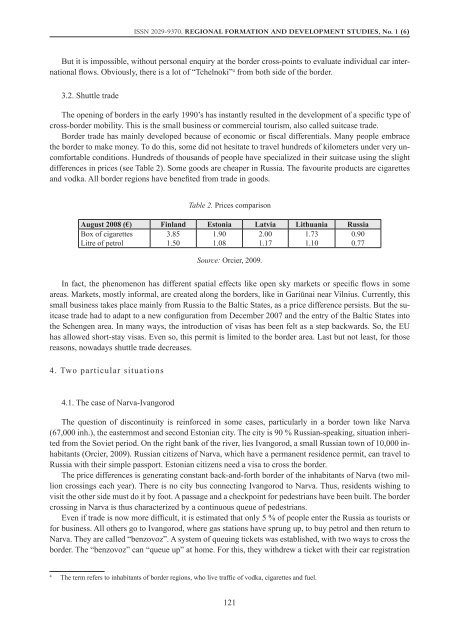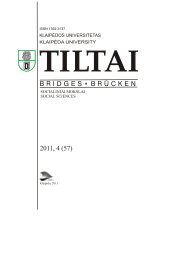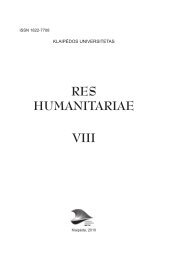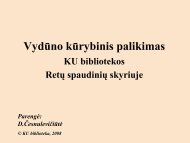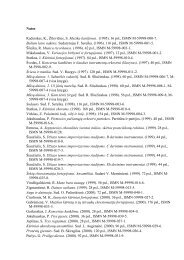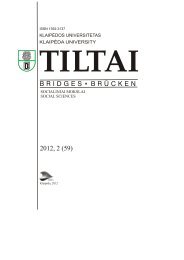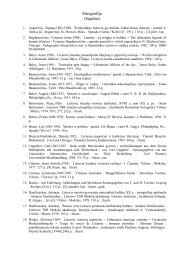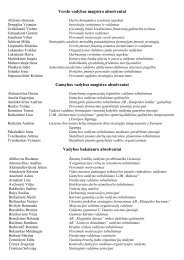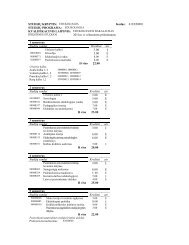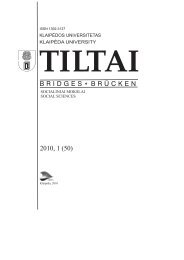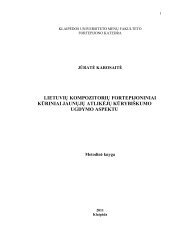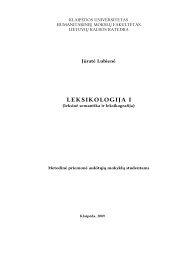Regional Formation 2012,1 - KlaipÄdos universitetas
Regional Formation 2012,1 - KlaipÄdos universitetas
Regional Formation 2012,1 - KlaipÄdos universitetas
Create successful ePaper yourself
Turn your PDF publications into a flip-book with our unique Google optimized e-Paper software.
ISSN 2029-9370. <strong>Regional</strong> <strong>Formation</strong> and Development Studies, No. 1 (6)<br />
But it is impossible, without personal enquiry at the border cross-points to evaluate individual car international<br />
flows. Obviously, there is a lot of “Tchelnoki” 4 from both side of the border.<br />
3.2. Shuttle trade<br />
The opening of borders in the early 1990’s has instantly resulted in the development of a specific type of<br />
cross-border mobility. This is the small business or commercial tourism, also called suitcase trade.<br />
Border trade has mainly developed because of economic or fiscal differentials. Many people embrace<br />
the border to make money. To do this, some did not hesitate to travel hundreds of kilometers under very uncomfortable<br />
conditions. Hundreds of thousands of people have specialized in their suitcase using the slight<br />
differences in prices (see Table 2). Some goods are cheaper in Russia. The favourite products are cigarettes<br />
and vodka. All border regions have benefited from trade in goods.<br />
Table 2. Prices comparison<br />
August 2008 (€) Finland Estonia Latvia Lithuania Russia<br />
Box of cigarettes 3.85 1.90 2.00 1.73 0.90<br />
Litre of petrol<br />
1.50 1.08 1.17 1.10 0.77<br />
Source: Orcier, 2009.<br />
In fact, the phenomenon has different spatial effects like open sky markets or specific flows in some<br />
areas. Markets, mostly informal, are created along the borders, like in Gariūnai near Vilnius. Currently, this<br />
small business takes place mainly from Russia to the Baltic States, as a price difference persists. But the suitcase<br />
trade had to adapt to a new configuration from December 2007 and the entry of the Baltic States into<br />
the Schengen area. In many ways, the introduction of visas has been felt as a step backwards. So, the EU<br />
has allowed short-stay visas. Even so, this permit is limited to the border area. Last but not least, for those<br />
reasons, nowadays shuttle trade decreases.<br />
4. Two particular situations<br />
4.1. The case of Narva-Ivangorod<br />
The question of discontinuity is reinforced in some cases, particularly in a border town like Narva<br />
(67,000 inh.), the easternmost and second Estonian city. The city is 90 % Russian-speaking, situation inherited<br />
from the Soviet period. On the right bank of the river, lies Ivangorod, a small Russian town of 10,000 inhabitants<br />
(Orcier, 2009). Russian citizens of Narva, which have a permanent residence permit, can travel to<br />
Russia with their simple passport. Estonian citizens need a visa to cross the border.<br />
The price differences is generating constant back-and-forth border of the inhabitants of Narva (two million<br />
crossings each year). There is no city bus connecting Ivangorod to Narva. Thus, residents wishing to<br />
visit the other side must do it by foot. A passage and a checkpoint for pedestrians have been built. The border<br />
crossing in Narva is thus characterized by a continuous queue of pedestrians.<br />
Even if trade is now more difficult, it is estimated that only 5 % of people enter the Russia as tourists or<br />
for business. All others go to Ivangorod, where gas stations have sprung up, to buy petrol and then return to<br />
Narva. They are called “benzovoz”. A system of queuing tickets was established, with two ways to cross the<br />
border. The “benzovoz” can “queue up” at home. For this, they withdrew a ticket with their car registration<br />
4<br />
The term refers to inhabitants of border regions, who live traffic of vodka, cigarettes and fuel.<br />
121


